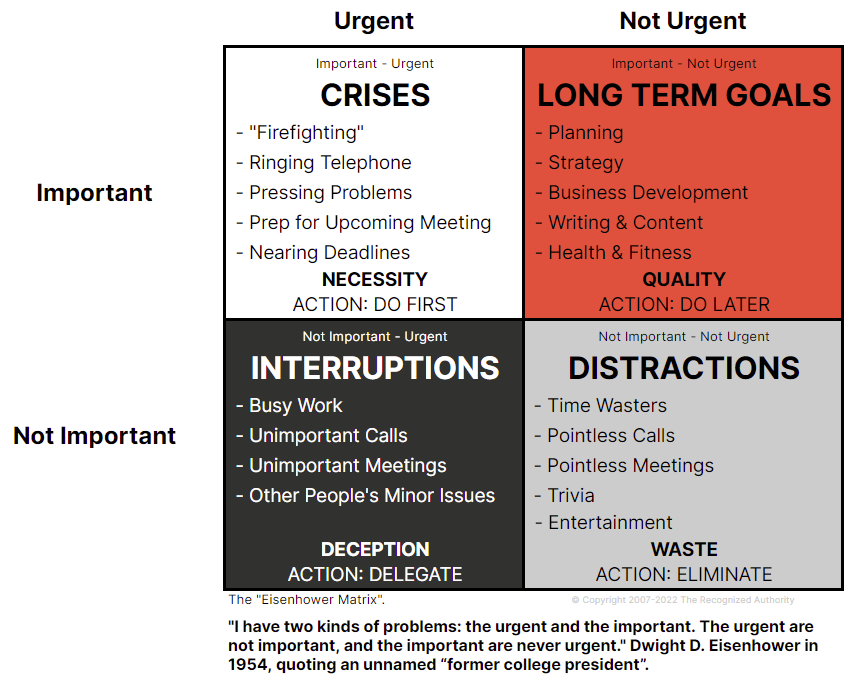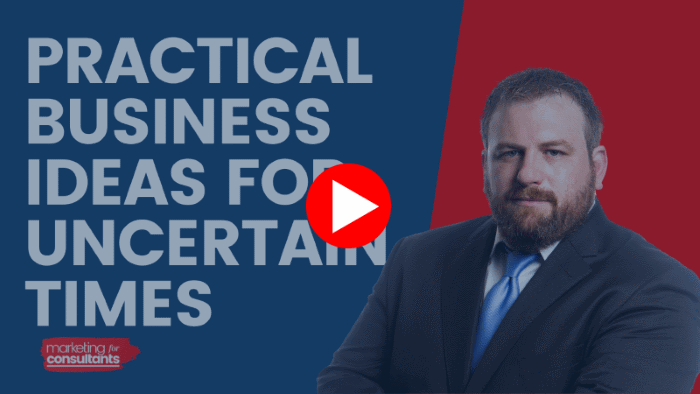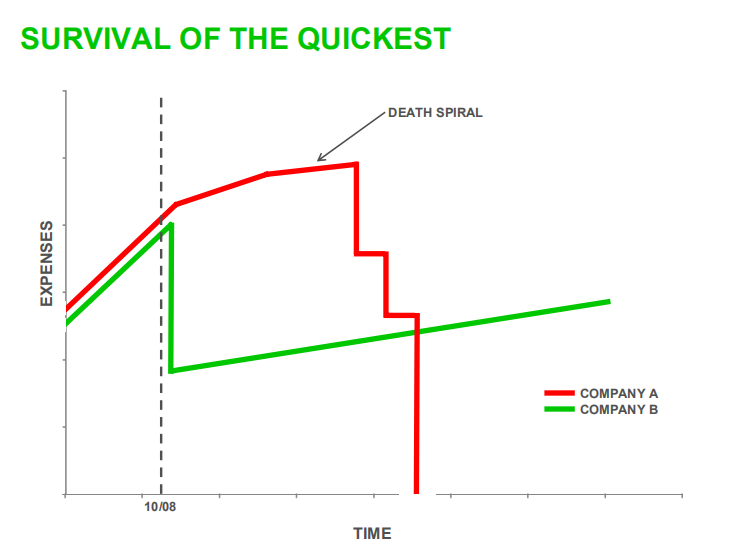“These are strange times.” – I’ve heard this said quite a few times today, and it sure feels appropriate.
I’m taking a few minutes here to share some thoughts on dealing with the business impact of this ongoing situation. I think a lot of people have been in firefighting mode, dealing with issues in front of them, not having a second to think about the bigger picture – if that’s you, then you might find this useful. Just to be clear on priorities: personal & family health always come first, business health second. But I’m not qualified or experienced with the former so I’m not going to talk much about that except to say this: a lot of people out there are sick, lonely and scared. Please be as understanding and sympathetic as you can.
Executive Summary
- High level overview: first, assess the situation and take decisive action, afterwards look at opportunities
- Call your clients – they are hurting & uncertain
- Show them you care – brainstorm some ideas with them about remote work, moving operations online, sales.
- Cash flow is key
- Check your government supports
- Send unsent invoices immediately
- Pause or cancel non-essential expenses
- Pause loan repayments (talk to your bank, and Revenue)
- Reduce receivable days
- Increase payable days
- Consider lay-offs and other measures
- Discount on case-by-case basis, particularly for expedited payment
- Work on sales, ask for referrals (not right this minute, but when things settle down a little)
- Remember: This Too Shall Pass. We’ll get through it.
High Level Overview
I’m using the Important – Urgent matrix here because I think there are 2 phases:
- “Firefighting” mode as we figure out the short-term problems
- “Deal with it” mode as we settle into a new routine of reduced cash flow – look for the opportunities
My suggestion for you is to prioritise the crisis and take quick action right now. Later this week start looking at what is in your IMPORTANT – NOT URGENT box – a downturn is a good time to address that, assuming you have your cash flow issues sorted out.

Watch Video Version of This Article

Business Health
I have been thinking about business health, particularly for small consulting firms like mine and yours. I spent several hours yesterday and today and talking and listening to some of the smartest business people in the world.
First, some perspectives: there’s a lot of uncertainty, fear and even panic out there. Yes, COVID-19 is very, very serious.
What I’ll say about that is keep in mind an ancient saying: This Too Shall Pass.
This Too Shall Pass
At some point, hopefully sooner rather than later, this will end. It’s probably going to be more like a series of different stages than a clean ending, and the financial and business implications could continue on for quite some time. BUT – this too shall pass!
Business Realities
Ok, a couple of business realities we’re facing: revenues will be down across the board in almost every sector.
Personally I’ve had thousands of euros worth of in-person training events postponed or cancelled, and I’m expecting an impact on other parts of the business as the knock-on effect happens.
Many businesses will be seeing drops of 15, 20, 30 percent in revenue. There will be some lay-offs and early retirements, and some businesses simply won’t survive.
Things will be very tough in events, sports, travel, hospitality and tourism while the social distancing recommendations stay in place. Currently that looks like the next 2-4 weeks, but it’s continuously being adjusted and could go on for several months. If your firm serves those sectors, you need to think carefully and take some action.
On the other hand, some sectors like medical products, remote working and online events will survive and thrive.
Ok, that’s the external situation: a mini-recession, consumer spending declining, businesses that don’t have enough financial resources to get through the difficult times will file for bankruptcy and lay off workers
Practical Steps We Can Take
What I’ve been thinking about is how you and I in the consultancy and professional services business can do to things:
- Firstly, we need minimise the impact on our own businesses. David Baker said recently “You need to put on your own oxygen mask first”
- And secondly, we need to help our clients as best we can. I’m going to talk about helping our clients first.
Helping Our Clients
In professional services we have the concept of fiduciary responsibility – acting in our clients’s best interest. Being a trusted advisor and arm around the shoulder. Our clients are unsure, fearing the worst, and some are already hurting, so I think that arm around the shoulder is more important right now than it ever was.
I spent most of the day on the phone today, calling around my clients, and I suggest you do the same on Monday if you haven’t already. A phone call is worth a hundred emails – having that real-time conversation with a person you get the impact of tone of voice and emotion.
Let them know you are aware of what they’re going through. Spend a few minutes talking with them about options to minimise negative impact on their business. Show you that you care, and that you’re on their side. Maybe schedule a strategy call with their executive team, or operations, or whoever you work with.
In terms of how you can actually help them, that’s going to depend on their industry and business model, but there are some general issues across the board: large teams all remote working for the first time; in person events needing to move online, training courses.
I think the most important thing is to show that you care.
Minimising the impact on our own business
And the other important thing is to make sure we put on our own oxygen mask – minimise the impact on our own business.
Cash flow is absolutely key.
In the words of Sequoia Captial:
Become cash flow positive as soon as possible

Pause or cancel non-essential expenses, particularly monthly recurring expenses.
Pause repayments: If you have a business loan, call your bank immediately to ask about getting a pause on repayments. I have a term loan with my business bank: I called them this morning and they were offering a 3 month break as standard policy.
Invoice immediately: if you have any unsent invoices, get them out right now. If you can, include electronic or online payment options to make it easier to get paid faster. You need to get that payment in before anything negative happens.
Reduce your receivable days – personally I’d rather discount 10% for upfront payment than wait 30 or 60 days for 100%, but this depends on your margins and business model.
Increase your payable days – ask suppliers for longer payment periods. They may not allow it, but if you don’t ask, you won’t know – perhaps they’ll even offer a discount for immediate payment.
Check your government supports – it will differ from country to country. There may be state and local supports also. For example, here in Ireland the government has expedited several measures aimed at dampening the impact, including:
- Fast-tracking a €203 per week refund to employers who continue to pay staff at that level
- A range of business support measures including grants, matched funds, credit guarantee schemes, and more
Review salaries & consider layoffs. This is horrible, but you need to take stock. If you can avoid layoffs through government supports or voluntary leave schemes, that’s fantastic. But beware of going into a slow “death spiral” instead of making the tough decisions.
Beware discounting, but make a decision on a case by case basis. There will be pressure on you to cut drop prices, you’ll have to make a decision based on relationship, cash flow and profitability. Remember to be kind and understanding if you’re dealing with folks going through a tough time.
Work on new sales to balance those projects that will inevitably be canceled.
Replace networking as a lead source: a lot of firms are quite reliant on networking events for lead generation, you need to think about how to replace it.
Positioning
When I’m thinking about business positioning, one of the questions I ask is “What is their painful, urgent problem that you solve?“
Right now, the answer to that might be a bit different to what it would be normally. It might be more about remote work and lead generation than the challenges that you normally help with.
You should probably accept non-ideal work. I’m a big fan of specialization, but even our Specialization Grandmaster Philip Morgan acknowledges that we should accept work outside of our niche if that’s what it takes to keep the lights on. “Stay in the game.”
Referrals
Ask for referrals. Maybe not right this minute, but sometime next week when things settle down, it will be the right time to start asking something like “Is there anyone else you know I can help?” “Do you know anybody who is facing similar problems?”
You might need to consider some outbound sales strategies. That’s a topic for another day.
Important Not-Urgent Business Development
If you suddenly have more free time due to cancellations, use it positively. I’m thinking of the Important Not-Urgent projects that you have been putting off because you never have time. Business development activities, content marketing, backlog of things like brand guidelines, creating productized services, maybe writing that book. It’s probably quite a good time to consider creating the online course you’ve been meaning to, or the website update:
One thing I'd be doing with the extra time that's piling up at your firms: fix your websites! My gawd, they are generally terrible. Keep it simple, basic, clear. Don't make me come down there and take it over, ok? Some tips: https://t.co/eowFhhFjqE
— David C. Baker (@davidcbaker) March 14, 2020
Longer term
There are longer term changes that we should think about – particularly the impact on working patterns as millions of people discover that 2 hour commutes are unnecessary, and their bosses find out that people are actually more productive when they’re not being disturbed all the time. What impact will this have on office real-estate? That’s worth thinking about!
In summary: keep a clear mindset, focus on helping your clients, make good strategic decisions about your business, and take action QUICKLY.
Remember to be kind – it’s not business as usual out there. Thanks for reading, stay safe, stay healthy and most importantly, stay calm out there!
Huge thanks to Richard Newton, Michael Ryan and Luca Ingianni for speaking with me about these topics this week. Also shout out to Philip Morgan and David C. Baker for content that inspired some of these ideas.
External Resources
- Resources for Resilience – a collection of resources curated by Philip Morgan
- Update on the Impact of COVID-19 On Your Marketing, Creative, or Digital Firm – David C. Baker – I recommend everyone watches or listens to this
- How To Work From Home With Your Kids Around – Jonathan Stark – Monday March 16 at 1pm Eastern Time – worth checking out for folks with kids in the house
- The “Scary Times” Success Manual – Dan Sullivan of Strategic Coach
- The famous “RIP Good Times” presentation from Sequoia Capital (2008)
- The Conference Is Canceled, What Do I Do Now? – article by Brad Farris on replacing in-person events with online
- Lyndall Farley on voluntary leave schemes to avoid redundancies
- Irish government supports for business

